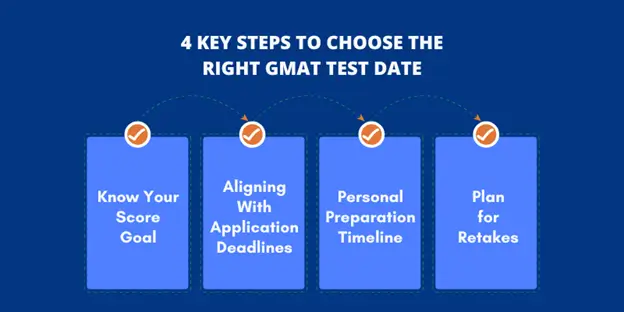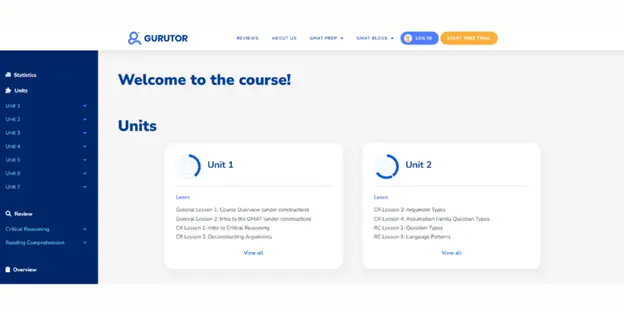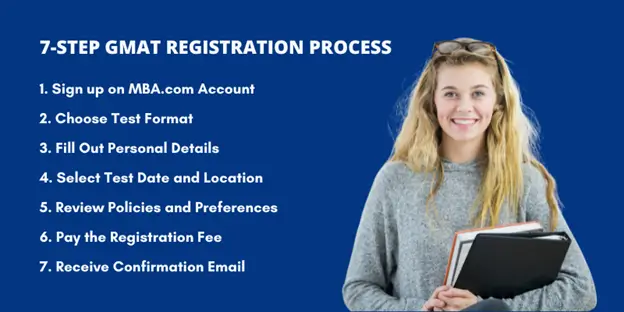GMAT Test Dates: How to Choose the Right Date for Your Exam

When should you take the GMAT?
On the surface, it feels simple because the exam is available year-round, allowing you to book a slot that fits your calendar.
But in reality, it is about finding the balance between your prep timeline, your target MBA deadlines, and even the possibility of a retake if things don’t go exactly as planned.
Pick too early, and you may leave points on the table because you weren’t fully prepared. Pick too late, and you risk missing application deadlines or losing your buffer for a retake.
Given this, your ideal GMAT test dates should give you enough prep time while aligning with your MBA application deadlines.
In this guide, we’ll break down the steps to choosing the right GMAT test date, so you can set yourself up for a confident test day, stay ahead of deadlines, and give yourself the best shot at your target score.
Understanding GMAT Test Dates Availability
Unlike many other standardized exams, there are no fixed “testing seasons” or limited slots.
You can take the GMAT almost any time of the year, which means you get to choose a test date that matches your timeline rather than working around someone else’s.
Here are a few things you should consider:
Year-Round Testing
The GMAT Focus Edition is offered year-round at authorized test centers worldwide and online.
You can book GMAT test dates up to six months in advance, which makes it easier to secure your preferred slot.
Continuous availability also means you don’t have to wait for a specific season, and you can plan your exam timeline strategically.
Here are the key things to know about year-round testing:
- Book early: Popular slots (like weekends and mornings) fill up quickly, especially at test centers.
- Flexibility: Both online and in-person formats allow you to select a date that works best for your schedule.
- Strategic planning: Scheduling early ensures you stay ahead of MBA application deadlines.
- Retake buffer: Early booking gives you room to retake the exam if your first attempt doesn’t go as planned.
Online vs. Test Center Exams
Choosing between online and GMAT test centers comes down to your comfort, logistics, and which GMAT test dates and time slots you can actually get.
- GMAT Online Exam Availability
Taking the GMAT Online gives you the most scheduling flexibility, and slots are available nearly every day and at many hours.
Here’s what you must consider:
- Book if your schedule is tight: 6 weeks (1.5 months) ahead.
- If you’re flexible or avoid peak windows, you’ll usually find plenty of options.
- Don’t rely on “same-day” booking; it’s possible but risky.
- GMAT Test Center Availability
In-person availability depends heavily on where you live.
Big cities and college towns usually offer more test centers and time slots, while smaller locations can fill up fast.
Here’s what you must consider:
- If you need a weekend or morning slot, book months ahead.
- If you’re in a major city and flexible on day/time, 45 days often works.
Action Tip: Check MBA.com for nearby centers and available GMAT test dates as soon as your study timeline is set.

How to Choose the Right GMAT Test Date
Here’s a step-by-step framework to help you pick your ideal GMAT test date:
1. Know Your Score Goal
Start by deciding the GMAT score you actually need, not just a vague “as high as possible.”
Target scores drive everything: which schools you’ll apply to, whether you need more study time, and how many retake opportunities you should reserve.
Therefore, pick a realistic target based on your target programs’ average admits and your baseline practice-test scores, then work backwards from that number when you set GMAT test dates.
2. Aligning With Application Deadlines
Most MBA programs accept applications in three rounds, though some schools offer four or more. A few, like Harvard Business School, have only two.
Once you’ve finalized your target programs, be sure to check their official websites for the GMAT registration deadlines.
For this, consider the following tips:
- List your target programs and their deadlines.
- Choose your test date at least 20 days before the deadline so scores can be processed, but don’t push that limit.
- Aim to complete your final, score-ready test at least 4–6 weeks before any deadline to allow time for a retake if necessary.
For example: if a round 1 deadline is mid-October, plan for a test in early–mid September at the latest.
3. Personal Preparation Timeline
Assess how much preparation time you realistically need.
Consider your job, family, and other commitments to determine how much time you can commit to studying and still meet your application deadlines.
Many candidates spend 2–6 months of part-time study (roughly 100–120 hours) on GMAT prep.
However, for a more structured study, consider using the best GMAT self-study platform: Gurutor.

Using a structured platform like Gurutor helps you turn hours of prep into measurable progress.
Unlike generic study materials, Gurutor provides step-by-step guidance, real-time feedback, and practice that mirrors the GMAT Focus Edition.
This ensures you’re not just practicing questions, but actually improving your reasoning, timing, and strategy to raise your score.
4. Plan for Retakes
Even with strong preparation, there’s a chance your GMAT score may fall short of your target on test day. Many applicants end up retaking the exam, and often improve enough to hit or even surpass their goal.
When selecting GMAT test dates, build in a cushion before your application deadlines.
According to the GMAT retake policy, a candidate must wait at least 16 days between attempts. Additionally, you’ll want to allow extra time to review mistakes and strengthen weak areas before retesting.
While most official scores are released within 5 business days, GMAC notes it can take up to 20 days for schools to receive them.
For example, if your round 2 deadline is December 1, scheduling your first test by mid-October gives you space for at least one retake while ensuring scores reach schools on time.
Quick GMAT Test Pre-Booking Checklist
Here’s a quick pre-test date booking checklist:
- Target score set and realistic based on practice tests
- All program deadlines are listed, and the calendar is mapped backward
- Retake buffer planned (3–6 weeks between attempts)
- Preferred format chosen (online vs. test center)
- At least one backup test date is reserved that still meets deadlines
- Study milestones aligned to the chosen test date
GMAT Registration Process
Here are the seven key steps to register for the GMAT Focus Edition:

1. Create or Log In to Your MBA.com Account
Start at MBA.com: create a free GMAC account or sign in if you already have one.
Your account is the hub for booking, managing appointments, accessing official prep, and sending scores.
2. Choose Test Format: Online vs. Test Center
Pick the GMAT Focus Edition delivery that fits your life, take it at home online or at a test center.
The exam content and scoring are the same; the difference is logistics, ID and room requirements, and available time slots.
3. Fill Out Personal Details
Provide your legal name, contact info, ID details, and any demographic/profile questions required during registration.
Importantly, this information must match the ID you’ll present on test day.
Note: Check GMAC’s ID requirements for your region if applicable.
4. Select Test Date and Location
Choose a GMAT test date and preferred time, and you can book up to 6 months ahead.
If you need a specific weekend or morning slot, reserve early; for online testing, make sure proctor times match your schedule.
5. Review Policies and Preferences
Read and agree to the GMAT policies and test-day rules (ID requirements, check-in procedures, break rules, cancellation/rescheduling fees) before confirming.
Remember, these differ slightly for online vs. center exams.
6. Pay the Registration Fee
Complete payment to secure your booking. The site accepts major cards and will show any additional fees (late booking, reschedule, or cancellation fees) during checkout.
Also, keep your receipt and note cancellation/reschedule windows.
7. Receive Confirmation Email
After payment, you’ll get an email with your appointment details, location, or online check-in instructions, and any prep links.
Save this confirmation and review the pre-test checklist on MBA.com a few days before exam day.
Tips for Securing Your Preferred GMAT Test Date
If you have a target application window, locking in the right GMAT test dates early takes a huge load off your shoulders.
Here are a few tips for securing your preferred test data and avoiding a last-minute scramble:
● Register Early
Once your timeline is set, select a target month and book accordingly. Many centers post GMAT exam schedules up to six months ahead, and weekend/morning slots fill fastest.
Choose a primary date plus one or two backups so you don’t lose momentum if your first choice is already gone.
● Check Availability Often
Calendars change as people reschedule or cancel; check MBA.com regularly and refresh the calendar if a slot you want is full.
If you watch frequently, you’re more likely to catch newly opened times.
● Have Backups and Stay Flexible
Know the reschedule/cancellation rules and fees so you can plan without panic.
If something comes up or if you get a practice-test surge and want to move the date earlier, you’ll be glad you planned alternatives.
That said, small actions now (book early, monitor the calendar, keep contingency dates) protect your prep rhythm later, so pick a date, secure it, and get back to studying.
Conclusion
Choosing the right GMAT test date is one of the smartest moves you can make in the MBA application process.
The exam is available year-round, which gives you flexibility, but that freedom only helps if you plan: book early, line your test date up with application deadlines, and leave breathing room for a retake if you need one.
Remember the logistics that affect timing: many candidates end up scheduling within about 45 days of test day, retakes require a minimum 16-day gap, and there are limits on annual attempts.
Additionally, score reporting can take time, so don’t cut it close.
Also, map your deadlines, set a realistic study schedule, and pick a primary and backup date that keep you calm, prepared, and ready to perform.
With a clear target, a sensible timeline, and a little scheduling discipline, you’ll give yourself the best shot at walking into test day confident and on schedule for the schools you want.
Stop Stressing About GMAT Test Dates, Plan Like a Pro with Gurutor
Take control of your GMAT prep with a clear plan and the right test date.
With Gurutor’s guidance, you can schedule strategically, stay on track, and give yourself the best shot at hitting your target score.
